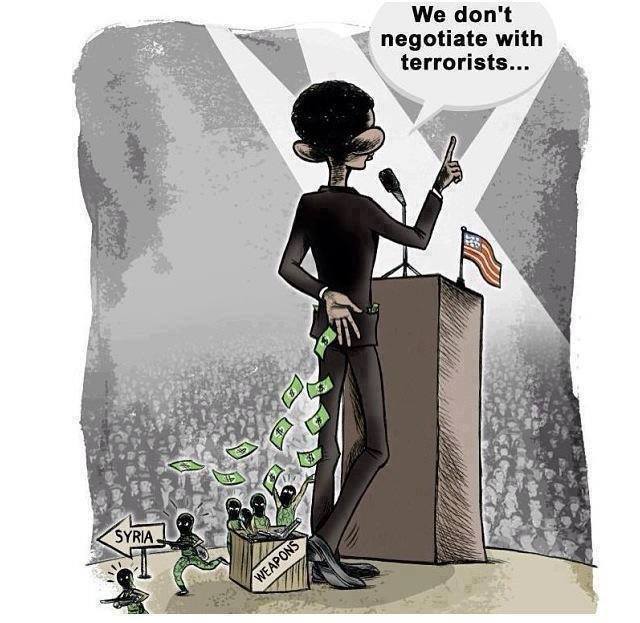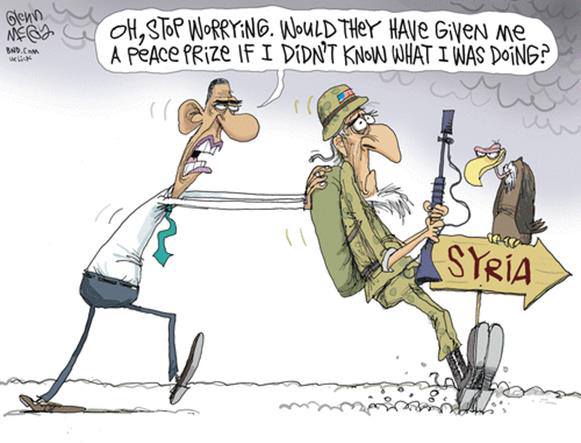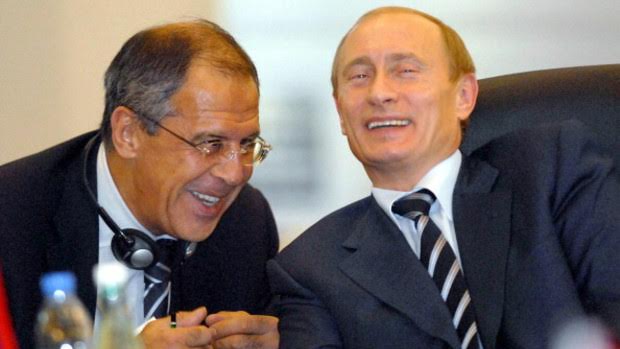Somehow, it has not sunk into the general consciousness of US public opinion that the Obama administration has supported or is supporting directly or indirectly, overtly or covertly, the forces of Al Qaeda and the Islamic State in Syria (ISIL, ISIS or Daesh) in order to overthrow the government of President Bashar al Assad in Damascus. This should not be surprising because most Americans do not believe that the US government could be on the wrong side of any conflict. The Mainstream Media (MSM), both print and broadcast, serve as purveyors of this general idea. Call it «fake news» or propaganda, it works well on US public opinion.
The MSM is being increasingly challenged by alternate media disseminated online. There you will discover that the US government is not all it claims to be. Thanks to Secretary of State John Kerry, via alternate media, we now know the reasoning behind US policy in Syria. Kerry explained the US position to a group of so-called Syrian «oppositionists» at the Dutch mission to the United Nations in New York on 22 September 2016. Some limited information about this private meeting was reported earlier in the MSM, but a clandestine recording of the full conversation is now circulating via alternate media. It is definitely Kerry in conversation with some unhappy Syrians, well, apparently Syrians, who thought the United States was not doing nearly enough to overthrow the Assad government. These unfortunate people sound like the émigrés of many countries going back centuries, who enjoy little popular support in their own countries. They therefore look to foreign governments to install them in power.
Kerry tried to explain to this group of émigrés that taking down the Assad government was easier said than done. «I am frustrated… it’s hard. Nobody is more frustrated than we are… The problem is everybody is upping the ante». Russia, Iran, Hezbollah… Nusra «put in more and then Turkey and Saudi Arabia put all their surrogate money in». What a mess for the United States, as though it was not a mess of American making.
«We’re trying to get to a negotiated process», said Kerry, «the problem is how do you get people to a place of being rational?»

Kerry did not mention that the US was supporting jihadist military organisations in Syria either directly with training, money and arms or indirectly, while others do that work
«We can always throw a lot of weapons in, but I don’t think that is going to be good for you… Al Nusra and Daesh make it hard because you have this extreme element out there and unfortunately some of the opposition has chosen to work with them». Kerry of course did not mention that the US government was pursuing an «Afghan policy» in Syria, that is, supporting jihadist military organisations either directly with training, money and arms or indirectly, by looking the other way, while others, like Turkey, Qatar and Saudi Arabia, do that work. When jihadists were moving around in the Syrian Desert, as easy targets for air attack, the US Air Force feigned not to notice them. When the jihadists exploited Syrian oil deposits and shipped oil for sale in Turkey, the US Air Force did not disturb them.
Kerry did not explain any of these pertinent facts to his Syrian interlocutors. Perhaps, they already knew anyway. In their discussions with Kerry, and this is a point as interesting as Kerry’s own remarks, the émigrés seemed quite comfortable supporting the jihadists’ cause although they played along with the bogus distinction between «moderate opposition» and «extremists».

In their discussions with Kerry, the émigrés seemed quite comfortable supporting the jihadists’ cause although they played along with the bogus distinction between «moderate opposition» and «extremists»
The Syrian émigrés wanted to know what the United States intended to do next. Last September, you may remember, Kerry was discussing with Russian Foreign Minister Sergei Lavrov a new ceasefire and negotiations to end the Syrian war. That deal was scuttled by a deadly American air raid on Syrian forces near Deir ez-Zor which appeared to be coordinated with a local jihadist offensive. The Russian high command accused the United States of a deliberate attack, which of course the Americans denied. But it meant that Russian-American negotiations went back to square one.
«We told the Russians and Iranians that we can’t just do the same thing,» Kerry explained to his so-called Syrian interlocutors: «we can’t just go out and announce a ceasefire if there’s no change to show that it’s serious. So we proposed to the Russians that they prove that they’re serious by having no warplanes flying, no Assad planes flying for seven days at least in order to prove to the opposition that they’re not going to get killed if they try to help people, if the humanitarian assistance comes in because it’s the airplanes that have been causing most of the damage».
These comments may strike readers as perplexing. In the event it has slipped anyone’s mind, the jihadists’ way of «helping people» is to massacre, terrorise or enslave them. We know that because we have seen the photographs and videos, which they themselves have taken of their bloody work. Kerry however represented them «as trying to help people». It sounds like an Orwellian inversion, but perhaps that is being unfair to the United States, so let’s hear what else Kerry had to say to his interlocutors.
«So, the Russians were willing to offer three days, and we said that’s not enough. You gotta be serious here. The deal we made in Geneva was seven days consecutive of calm before we would talk about focusing on Daesh and Nusra». This appeared to mean that the truce would also be extended in effect to Daesh and Nusra, even though UN resolutions and Russian and Syrian declarations made clear that they, Daesh, Nusra, and affiliated terrorist groups, were excluded from any truce or other negotiations.
Here was yet another way in which the US government was attempting to help the jihadists in Syria by sparing them from air attack at least temporarily. Of course, it was the Americans who wrecked the previous agreement by attacking the Syrian Arab Army (SAA) at Deir ez-Zor on 17 September, five days before the meeting in New York, and who had never respected any previous agreement with the Russian Federation. So, from the Russian point of view, Kerry’s claim that Russia had to get «serious» must have seemed derisory.
For the émigrés listening to Kerry this explanation raised no objection. It was the lack of direct American military intervention, especially to break «the siege of Aleppo», which aroused their discontents. The émigrés claimed that the Russians were attacking civilian targets, and the United States and the «international community» needed to intervene to stop them.
Do you have any video evidence? Kerry wanted to know: do we have anyone in Aleppo [he asked an aide present at the meeting] who could help with finding evidence? «We do», came the reply. It was Al Qaeda and its affiliates which then held E. Aleppo, and thus the so-called Syrians present were asking Kerry for US intervention to help Al Qaeda break the SAA siege of E. Aleppo. Here also was an indication that the United States had agents in E. Aleppo, a point confirmed months later by the capture of at least one such US agent amongst various foreigner «advisors» arrested by the Syrian Arab Army as the last pockets of Al Qaeda resistance in E. Aleppo were cleared out.
The meeting turned out to be an opportunity for the émigrés to complain bitterly that the United States was not doing enough to overthrow the Assad government. This gave Kerry an opening to blame the Russians, as you might have guessed.

«We don’t even have what we had in Kosovo where we had, you know, an existing resolution and so forth, even though we went alone», Kerry was quoted as saying
«The problem is that the Russians don’t care about international law,» said Kerry, «and we do. And we don’t have a basis, our lawyers tell us, unless we have a UN Security Council resolution, which the Russians can veto, and the Chinese, or unless we are under attack from the folks there, or unless we are invited in. Russia is invited in by the legitimate regime… well still legitimate normally, by the regime. And so they were invited in, and we’re not invited in. We’re flying in air space there where they can turn on air defence and we have a very different scene. The only reason they are letting us fly is because we’re going after ISIS. If we were going after Assad, those air defences, we would have to take out all those air defences, and we don’t have a legal justification practically for doing that unless we stretch it way beyond the law on a humanitarian basis which some people will argue we should, by the way. Ah… but so far American legal theory has not gone into the so-called right to protect, and ah… we don’t even have what we had in Kosovo where we had, you know, an existing resolution and so forth, even though we went alone».
The Kosovo precedent has been causing the United States a lot of trouble with regard to the Ukraine, though Kerry did not bring up that subject with his Syrian interlocutors. Readers might be surprised by Kerry’s statement that unlike the Russians, the United States respects international law. If ever there was a case of Pot calling Kettle black, this is it. «Jupiter may do what an ox may not», as President Vladimir Putin said recently about the United States. Since when does Washington respect international law? Although Kerry did not mention it, there was no Gulf of Tonkin incident (Vietnam), or weapons of mass destruction (Iraq), or the massacre of innocent civilians (Libya), which the US government could use as a pretext for intervention. It is also amusing to note that Kerry inadvertently acknowledged that the Assad government was the legitimate Syrian government, though he tried weakly to back track on that, referring in the end to «the regime».

«And a lot of Americans don’t believe we should be fighting and sending young Americans over to die in other countries. That’s the problem»
«Ah… so it’s complicated. It’s… ah, not easy», Kerry explained: «And we’ve been fighting, how many wars have we been fighting? We’ve been fighting in Afghanistan, we’ve been fighting in Iraq, we’ve been fighting in the region, you know, for fourteen years. And a lot of Americans don’t believe we should be fighting and sending young Americans over to die in other countries. That’s the problem. Ah… Congress won’t vote to do it. And you can be mad at us, but what we are trying to do is help Syrians to fight for their own country. And we’ve been spending a lot of money and a lot of effort to try to help do this. So, there is an opposition there, and the opposition is doing very well. But Russia came in, and that’s a problem, I know, because you know we… ah… we don’t behave like Russians. It’s just a different standard. So we are trying to see whether we can put to a test whether Russia is serious about a political solution. And if they’re not serious, then we will help the opposition more. But you know I don’t think that will be good for the citizens of Syria in the end because it will mean more fighting».

Can you imagine Lavrov laughing and shaking his head, as he listened to Kerry’s words that the US cares for international law?
There he goes again, you might be thinking. «We don’t behave like the Russians. It’s just a different standard». I am sure Lavrov and Putin would at once agree, but not in the way that Kerry meant. After all, since 1945, is there any destroyer of nations and governments on a par with the United States? And Kerry wants «to test» the Russians. Can you imagine Lavrov laughing and shaking his head, as he listened to these lines?
American double standards were of no interest to the émigrés talking to Kerry. Pot calling Kettle black was not their problem. They were resentful that the United States would not do more to overthrow Assad. Only «the extreme Sunnis» were being targeted, they complained, and not Hezbollah and Iraqi and Iranian troops— «terrorist groups», said one émigré — allied with Russia and Assad. «They are targeted by the opposition», Kerry interjected, trying to be encouraging, «who we are arming and training». But the émigrés still complained that not enough political and military support was being given to «those who consider [themselves] moderates».
«Well let me ask… [my aide, Kerry said] I think we’ve been putting in an extraordinary amount of arms, haven’t we?.. Qatar, Turkey, Saudi Arabia, a huge amount of weapons coming, and a huge amount of money.» So here from Kerry we have the truth at last. The rogues’ gallery, the United States and its regional vassals, are backing to the hilt the jihadist invasion of Syria. Only one thing went wrong with the US plan.

War is full of the unexpected, as Kerry should know
«I mean, the reason Russia came in is because ISIL was getting stronger. Daesh was threatening the possibility of going to Damascus… and that’s why Russia came in. Because they didn’t want a Daesh government, and they supported Assad. And, ah, we know that… we were watching, we saw that Daesh was growing in strength, and we thought Assad was threatened. Ah… we thought however we could probably manage… ah… you know that Assad might then negotiate, but instead of negotiating, he got… Putin to support him.» War is full of the unexpected, as Kerry should know.
The US plan was to let Daesh threaten Damascus, using Daesh to pressure Assad into «negotiating». That’s why US warplanes did not bomb easy Daesh targets, or only pretended to do so. But instead of capitulating, Assad obtained Russian support to continue the fight against the US brokered and bankrolled invasion. Readers may wonder incidentally how Kerry would fit US intervention into international law. He’d need America’s best lawyers for that.
«So, it’s truly complicated, I mean you know how complicated it is, you live in it», Kerry continued. «For us politically where we have a Congress that will not authorise our use of force. Congress will not pass that, and so we’re trying to help in the best way we can, but we finally decided the best thing we can do is try to find a political solution where the opposition is part of the government, and you can have an election, and let the people of Syria decide who they want.» Trouble is the émigrés present did not think elections would work for them. Assad, they said, would win through intimidation or fixing the vote. Kerry responded that since refugees abroad could vote, that Assad could not win and that their victory in effect was assured. «Democracy has some virtues», Kerry opined. But the émigrés were not persuaded. Assad’s secret police threatened to kill my mother, one émigré claimed. The Russians would make sure the elections favoured Assad; why else would they agree to them. People in that part of Syria «controlled by the regime» would not dare vote against Assad. Was this a backward admission that Syrians would vote for Assad? No doubt it was.
«So you think the only solution is for someone to come in and get rid of Assad?» Kerry asked.
«Yes», an émigré replied.
«[If]that’s the only solution,» Kerry interjected: «Who’s is that going to be, who’s going to do that?»
«Three years ago, I would have said you,» the émigré replied: «but right now I don’t know».
«Well, look it’s a hard choice… I’m sorry, but, ah, we’ve lost thousands of young Americans in a lot of countries», Kerry replied, «and it’s pretty difficult right now to get Americans to say we’re going to send Americans to gain another country, and have a war with Sunnis and Shia and extremists and everybody, and I mean, you know, it’s more complicated than you think… There are lots of places in the world where they want to hold our coat while we go fight but it’s not easy and we are trying to empower Syrians to be able to fight against this guy [Assad]. You know, the Russians have changed the equation unfortunately… and it’s a little more complicated. So we are trying to figure out a way to get to the table, if we can, and save lives. I don’t think any country has worked harder to save lives than we have. We’ve given more money than any other nation for refugees regarding Syria… We’re not disengaged… we’re saying we going to do as much as we can within, you know, the scope of what we can do here».
No doubt Kerry would be shocked to know how others see US behaviour abroad. It’s certainly not working harder than anyone «to save lives». Indeed, a skeptic might reply: ‘Oh, you mean like in Yugoslavia, or in Afghanistan, or Iraq, or Libya?» Hypocrisy and double standards, as Putin has sometimes noted, never seem to trouble the American government.

«I am the guy who announced that we’re going to attack Assad because of the rockets [?] and, you know, things evolved into a different process».
«I think you are looking at three people, four people in the administration,» Kerry went on, «who have all argued for use of force, and I lost the argument. I’ve argued for the use of force. I stood up, I am the guy who stood up, announced that we’re going to attack Assad because of the rockets [?] and, you know, things evolved into a different process. But the bottom line is… ah… that we, that Congress refused to vote even to allow that…»
«What is the bottom line…», asked an angry émigré, «how many Syrians… what will be the end of it?»
«I think that people in Washington right now are deeply frustrated, as you are,» Kerry replied, «and we are talking now about what enforcement mechanisms we can now take, and it may be that we will lift up the options because of the frustration, because of Assad’s indifference to anything, so there’s a different conversation taking place because of what has happened in the last few days. We’ll see what happens».
You don’t need to send any soldiers, «just impose a no-fly zone», proposed another émigré.
«Well, there’s more and more talk, we’re trying to get an agreed upon no-fly zone… The Russians have agreed that if we get this process going, Assad won’t want… but if we’re going to force a no-fly zone, we’re going to have to attack every air defence, and then we have to be willing to fly airplanes every day to enforce it. And it’s very costly and… a big deal».
«In the long term, I think it’s cost effective», replied an interlocutor.
«I am frustrated too… Everybody at this table wants to do more». And with that comment by Kerry, the meeting ended.
Left unsaid was that to attack Russian and Syrian air defences would mean war with the Russian Federation. If the American people will not accept another war with a small country, they certainly will not accept a nuclear war with a great power like Russia. Kerry’s explanations are nevertheless illuminating and no doubt provoke a great deal of laughter in Moscow. The discontents of the émigrés are also illuminating. They expressed their open sympathy for Al Qaeda in E. Aleppo, but they didn’t think they could win elections against Assad even if foreign supervised, and even with refugees abroad eligible to vote. Someone will have to come in to win for these Syrians, if they are Syrian, and of course that means paying a price to their «liberators,» which would mean serving as their compradors. These Syrian émigrés, like émigrés before them, don’t mind paying that price, don’t mind allying with Al Qaeda, because they themselves don’t have popular support and can’t defeat Assad on their own. They admitted as much to Kerry. That most of all may be causing the frustration in Washington, along with Russia’s roll in «complicating» and exposing American strategy in Syria.









